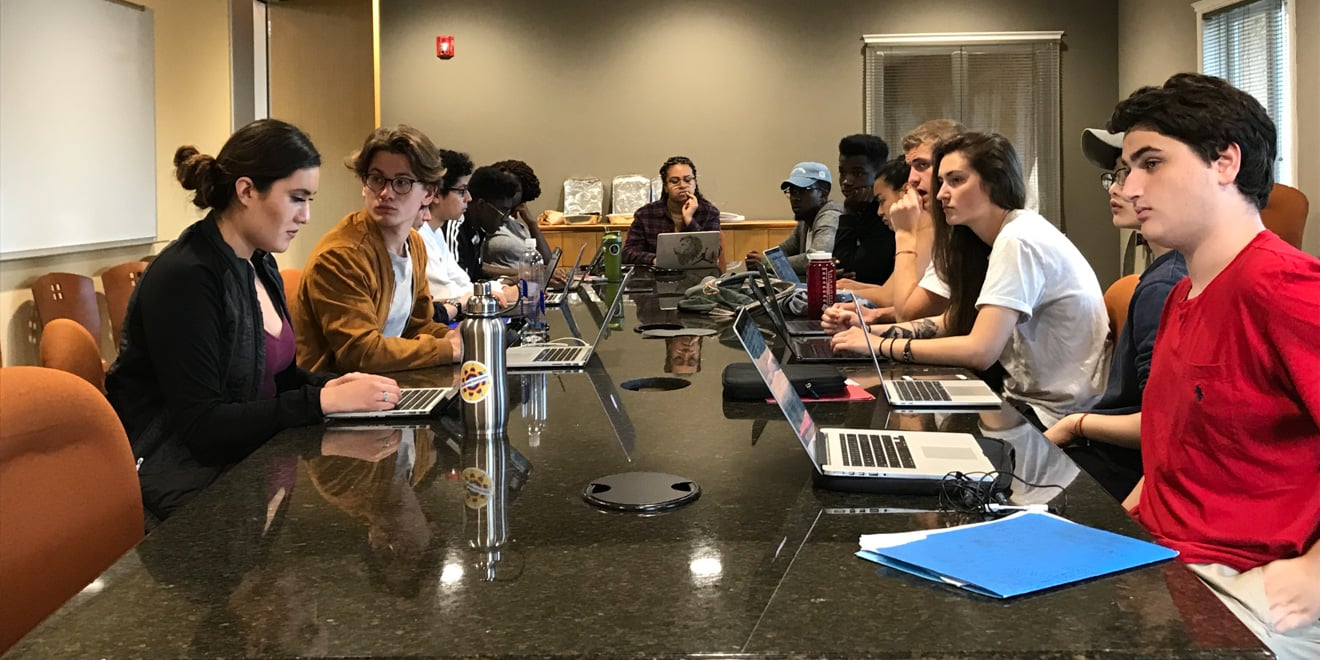In its third meeting, the 20th Undergraduate Senate discussed the General Use Permit and funding for student groups. Before that, however, the Senate held a closed session that lasted approximately 40 minutes.
Secretary David Jaffe ’21 was the only Senate affiliate excluded from the closed meeting, and Senate Chair Leya Elias ’21 asked The Daily to leave the room.
The closed session appears to have been in violation of a clause in the ASSU Constitution which states that “information regarding the general content of a closed meeting and the reason for its closure shall be made available to the public 24 hours in advance of the meeting.”
According to Elias, public information on the closed session was released in a meeting agenda sent out to the ASSU Senate mailing list on Monday, May 14.
“Anyone can subscribe to that list,” Elias said.
However, no information regarding the session’s “general content” nor the “reason for its closure” were posted as part of the agenda, which merely states that ASSU Financial Manager Jelani Munroe ’16 would be delivering an unspecified presentation.
Immediately before the closed session commenced, Elias informed The Daily that the content of the session was centered on the upcoming year’s Senate budget.
At her first official meeting as a senator, upon being sworn in as Chair, Elias stated a desire “to increase transparency and honesty” in the body.
According to ASSU Executive Shanta Katipamula ’19, “there was no malicious intent” behind the closed meeting.
“I think it’s important to recognize that this is a new Senate,” Katipamula said. “This is the first closed meeting Leya has sent out an agenda for. It was a budget presentation, which has always been closed. It will always continue to be closed.”
Katipamula disputed the claim that the meeting was in violation of any constitutional clause.
“There was no violation of the Constitution that occured,” she said. “I think it was just that [Elias] forgot to note the reasoning.”
Elias also disputed that the Constitution had been violated.
“[The ASSU Constitution] says that the Senate can close meetings to discuss proprietary business practices,” she said. “It doesn’t say anything about me having to disclose exactly what that is.”
Senate Parliamentarian Faa Diallo ’21 further stated that “there is no provision in the Constitution detailing the content of the notice nor the level of detail required in the notice.”
However, the phrasing of the constitutional clause, which requires that the Senate disclose “information regarding the general content of a closed meeting” as well as “the reason for its closure” beforehand, seems to suggest otherwise.
This isn’t the first time the 20th Senate has been found in potential violation of ASSU constitutional clauses regarding transparency in student governance. Earlier this month, the Senate held a secret 8 a.m. meeting intended to help incoming Senators prepare for their new roles and determine which Senators would run for which Senate leadership positions. Although former treasurer Katie Hufker ’18 emphasized the informality of the meeting, it was held behind a locked door, and was not publicly advertised ahead of time.
As with Tuesday’s meeting, the Senate also attempted to remove The Daily from that one, before eventually relenting after the reporter covering the event cited the open information clauses of the ASSU Constitution.
Senate Deputy Chair Jianna So ’21, Secretary David Jaffe ’21 and Appropriations Chair Gabe Rosen ’19 did not respond to The Daily’s request for comment on Tuesday’s closed session.
Following the closed session, the Senate funded quick grant requests for all student groups who applied except for the Stanford NAACP. The NAACP had requested a reserves transfer in order to put on an event about intersectionality with members of the LGBT+ community. However, the speakers at the event required a contract that had not been signed by Student Activities and Leadership, which left the Senate constitutionally unable to fund the event at this time. The NAACP’s request was tabled for next week’s meeting.
During the ASSU Executive report, Katipamula noted that while applications for Cabinet and Constitutional Council positions were closed, some Cabinet positions “didn’t get as strong of a pool of applicants as we were looking for.” She encouraged Senators to reach out to their friends who might be interested in applying.
“We want to make sure that we’re choosing from the absolute best candidates out there,” said Katipamula, adding that she hopes the Cabinet will be finalized by the end of next week.
The Senate also discussed a proposed joint resolution on Stanford’s General Use Permit (GUP). The GUP is the proposal for Stanford’s land use development through 2035, which will involve the construction of several million square feet of academic space and thousands of new housing units.
The bill, authored by Stanford Coalition for Planning an Equitable 2035 and co-sponsored by Graduate Student Council member Caleb Smith ’17 MA ’18 and Undergraduate Undergraduate Senator Melissa Loupeda ’21, states that “the current General Use Permit proposal resoundingly fails to offset the impacts of the proposed development on the low-income residents of Santa Clara County and the wider Bay Area region.”
During an open forum, Rosen — the only returning Senator for the second year in a row — stressed the need for electoral reform.
“We have to figure out some way to make institutional memory transfer much more sustainable,” Rosen said.
Senator Michal Skreta ’21 closed the meeting by urging Senators to “always read the bills.”
“The last thing that we want to see is if we voted on something and accept something, and we then cannot defend our vote,” said Skreta.
Contact Erin Woo at erinkwoo ‘at’ stanford.edu and Claire Wang at clwang32 ‘at’ stanford.edu.
